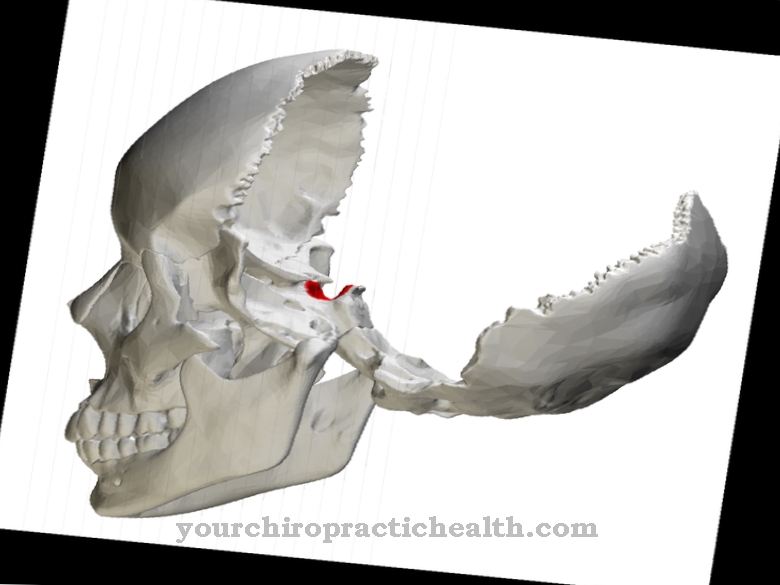At the snoring Loud noises come from the upper airways during sleep. A distinction is made between snoring primary snoring and obstructive snoring. In the first form, there are no further disturbances to the breathing rhythm. Obstructive snoring can cause breathing difficulties or shortness of breath. The typical snoring disease of sleep apnea is also found in this context. Around 70 percent of all men snore in their life. Usually, however, snoring occurs from the age of 50. Statistically speaking, women snore less.
What is snoring?

The term snoring describes noises that a sleeper makes through the airways. Doctors also call normal snoring compensated snoring. It has no disease value. The older you get, the more likely you are to snore. Men are affected more frequently than women.
If you snore heavily, the oxygen supply can be disturbed. In this context, the sleep disorder of sleep apnea also arises. In this case, it is obstructive snoring. Obstructive snoring is considered a sleep-related breathing disorder if it occurs regularly. The technical terms are rhonchopathy, upper airway resistance syndrome and obstructive sleep apnea syndrome.
It is still under discussion whether Upper Airway Resistance Syndrome and Obstructive Sleep Apnea Syndrome are one disorder or two different forms, or whether they are two degrees of severity of the same syndrome. Studies have shown that obstructive snoring leads to an increased risk of high blood pressure, stroke or heart attack.
causes
Snoring is caused by a movement of the soft palate, the pharynx, the base of the tongue or the throat, which is created during sleep. Curvatures of the nasal septum, inflammation of the maxillary sinuses, enlarged turbinates, or allergies can cause snoring individually or in combination. These circumstances interrupt the flow of breath for a short time, leading to a rattling or rattling noise, known as snoring.
Other causes of snoring can be found in the room and in the sleeping position. Too dry room air, bed mites or lying on your back make snoring easier. Obesity can also lead to increased snoring. A genetic predisposition can cause snoring. In addition, alcohol consumption or the use of sleeping pills, narcotics, tranquilizers or psychotropic drugs can contribute to slackening the soft palate and making snoring noises. Some causes of snoring can therefore be minimized or prevented.
You can find your medication here
➔ Medication for sleep disordersDiseases with this symptom
- Sleep apnea
- Adenoids
- Sinus inflammation
- Obesity
- Curvature of the nasal septum
- Nasal polyps
Complications
Snoring can affect the sleeper in several ways. First of all, excessive snoring will reduce the quality of sleep, which can lead to difficulty concentrating and daytime sleepiness. If night sleep is disturbed for a longer period of time, the risk of accidents in everyday life also increases.
Snoring increases the risk of high blood pressure and thus can be a risk factor for heart disease and stroke. In the long run, excessive snoring can also cause the oral mucous membranes to dry out and increase the risk of tooth decay. Patients with pronounced sleep apnea are particularly at risk.
The disease permanently triggers stress reactions in the body, which increases the risk of serious diseases of the cardiovascular system. If a snoring disorder is not treated at an early stage, further complications can arise, which always depend on the severity of the disease and the patient's constitution.
A snoring disorder often also stresses the partner and can lead to relationship conflicts and thus to further stress and an intensification of the subsequent symptoms. If snoring is treated surgically, it can lead to secondary bleeding and long-term problems such as difficulty swallowing or open nasalism. With laser treatment, however, complications are relatively rare.
When should you go to the doctor?
First of all, snoring is not uncommon while sleeping. Many people have a tendency to snore and most of the time they don't even know it. Snoring can also be caused by illness, so a doctor should be consulted. But which doctor is the right one for this? If nocturnal snoring becomes a burden for humans, it should be clarified what causes the snoring. If the loud snoring disturbs the environment and the volume or makes you wake up yourself, a doctor should be consulted from there.
The causes must be found out in order to initiate the correct and individual therapy. Specialists such as a pulmonologist or an ear, nose and throat specialist are the right place to go. Of course, the family doctor or internist also takes the anamnesis. This will then refer the patient to a specialist in sleep medicine diagnostics. A sleep laboratory can provide a comprehensive search for the cause of nighttime snoring. These sleep laboratories can detect or rule out sleep abnea and other illnesses at an early stage.
Doctors & therapists in your area
Treatment & Therapy

Obstructive snoring and sleep apnea should be treated by a doctor. The type of disorder can be determined in the sleep laboratory. Surgical interventions such as surgical tightening of the soft palate and the pharyngeal mucosa or a partial removal of the pharynx suppository sometimes make sense. The removal of the tonsils is more effective against snoring.
Recently, the palate has been treated with radio frequency therapy. This reduces snoring. Snoring can also be treated with a radiofrequency-assisted uvulopalato plasty and removal of excess tissue from the palatal arches and uvula. Soft palate implants hardly promise success against snoring.
Surgical straightening is possible if the cause of snoring is to be found in a curvature of the nasal septum or turbinate enlargement. Chronic maxillary sinus and sinus infections as the cause of snoring are treated with various measures.
Nasal patches or anti-snoring devices promise more success than they achieve. A jaw protrusion splint, which adjusts the lower jaw of the sleeping person, makes more sense. You can also train a different sleeping position. Most snorers consider wearing a mask for night-time positive pressure ventilation to be more annoying than snoring itself.
Outlook & forecast
Snoring usually poses no health risks and does not require treatment. However, if breathing pauses or other sleep disorders occur, a doctor's visit is recommended. If left untreated, sleep apnea increases the patient's mortality fourfold and reduces life expectancy by around ten years.
The prognosis is not life-threatening, but depending on the severity of the disease, longer breathing pauses may occur. Nasal snoring, which occurs as a result of a nose that is too narrow or as a result of colds and allergies, promises a positive prognosis if the symptoms are treated quickly. If left untreated, mouth snoring can lead to the development of infections in the oral cavity or the swallowing of foreign bodies. When snoring the tongue, there is a risk that the tongue will be swallowed, which can lead to respiratory failure.
If the snoring has a cyst, it must first be treated. As a result, snoring also decreases again. In general, the following applies: if snoring is detected early and there is no serious underlying disease, those affected have the prospect of a full recovery without complications or long-term consequences.
You can find your medication here
➔ Medication for sleep disordersprevention
By changing the sleeping position or elevating the head, snoring can often be remedied more effectively, as it occurs in the supine position. Reducing obesity and drinking alcohol in the evening is just as effective against snoring as omitting anesthetic medication, increasing the humidity or reducing bed mites through anti-allergic filling materials and protective covers.
Snoring may be reduced with a snoring bandage. Muscle training with a didgeridoo has also proven to be helpful against snoring. As a preventive measure against snoring, you can also go jogging or hiking regularly. A healthy diet and plenty of exercise in the fresh air not only increases general well-being, but also contributes to better and deeper sleep.
You can do that yourself
There are several ways and home remedies to reduce snoring. The easiest way is to change your sleeping position and sleep in the prone position. It also helps to widen the airways before going to bed with a steam bath with table salt or a snoring plaster. Essential oils clear the throat and lungs and can be placed in a bowl next to the bed, which also humidifies the room air and makes it easier to breathe deeply at night.
Regular snorers should ventilate their bedroom before going to bed and ensure a comfortable indoor climate. There may also be a house dust or mite allergy that needs to be treated by a doctor. Those who are overweight can reduce snoring in the long term by losing weight. In addition, alcohol should not be drunk before going to bed, as this relaxes the soft palate and thus encourages snoring.
If the partner is snoring, it can help to gently touch the larynx or throat, stroke the bridge of the nose, or slightly raise the sleeping position of the upper body. If snoring becomes a burden, a doctor should then be consulted at the latest.


.jpg)






















.jpg)

.jpg)
